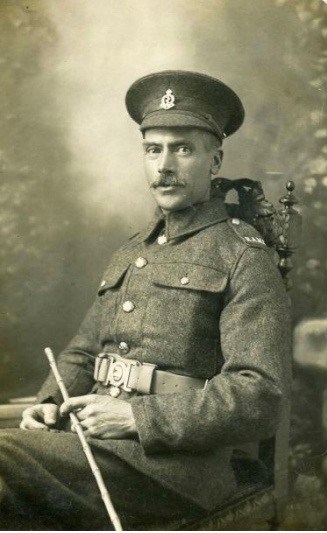Thank you to Westcott Local History Group for allowing Dorking Museum to publish their First World War research.

Frederick Charles Barnes is not named on our war memorial, but he is buried in a war grave in Westcott, so we remember him. He was the son of Frederick Barnes, a coastguard, and his wife Harriet, and was born in Deal, Kent in 1878. He became a gardener and was living at Cliffe, near Dover, when he met Lucy Woods who had spent her childhood in Westcott, and who was in service near there, possibly working for Lord Carrington at his house near Folkestone.
Lucy’s parents were still living in Westcott and when Frederick and Lucy decided to marry, they did so in this church on Boxing Day 1903. After their marriage they returned to Kent and the 1911 census records them living at Ballardowgan, 89 Kingstown Road, St Margaret’s at Cliffe where Frederick had employment as a gardener and Lucy as a laundress.
After the outbreak of war, Frederick enlisted at Dover and joined the Royal Army Medical Corps. After completing basic training he joined 18 th Field Ambulance RAMC, one of the three Field Ambulance Units in the 6th Infantry Division which had landed at St Nazaire on 10th September 1914 and was to serve continuously on the Western Front for the rest of the war.
Field Ambulances were responsible for establishing and operating the casualty treatment and evacuation chain from the Regimental Aid Posts, close to the front line, back to Advance Dressing Stations and further back to Main Dressing Stations several miles from the front. Their tasks were to treat the lightly wounded so they could return to duty if possible, and evacuate more serious cases to Casualty Clearing Stations for treatment.
In March 1918 the 6th Infantry Division was at Lagnicourt, near St Quentin in a section of the line which had recently been taken over from the French Army. The trench system was in a poor state and it was against this sector that the Germans launched their spring offensive, known as ‘Operation Michael’, in a bid to win the war before the Americans reached the front. Their assault began on 21st March 1918, with a huge artillery barrage concentrated on the forward trenches. Chlorine, mustard and tear gas shells were used extensively and the British lines were in places overwhelmed by the German infantry assault that followed behind the barrage. The 6th Division suffered severely, sustaining 3,900 casualties from a strength of 5,000 infantry.
This was the Allies’ worst crisis of the war. The British were pushed back some 40 miles but refused to crack and the line eventually held. The tide of battle turned. Exhausted by their efforts and short of transport and supplies, the Germans had to fall back. In July the Allies began an advance which continued until the Armistice was concluded on 11th November 1918.
All we know of Frederick Barnes is that he was brought back from France to a military hospital in Bromley suffering from gas poisoning. He never recovered and died on 31st March 1918. The Arras memorial commemorates a number of men from 18th Field Ambulance who were killed in action on the first day of ‘Operation Michael’, and it seems likely that Frederick was a victim of the huge gas barrage that the Germans launched that day.
At the time of Frederick’s death his wife Lucy was living at 2 Chapel Lane, Westcott and it was therefore to Westcott that Frederick’s body was delivered for interment. Lucy applied for Frederick to be buried in the churchyard of Holy Trinity, but this was refused because ‘he was not a local man’ – the reason for this may be that space in the churchyard was very limited at that time. Lucy was deeply upset by this as it was at Holy Trinity that she and Frederick had been married. She turned to St John’s Chapel where the Minister readily gave permission. Frederick’s grave in the chapel graveyard is marked by a Commonwealth War Graves Commission headstone, and he is also remembered on the war memorial at St Margaret’s at Cliffe in Kent.
William Woods, who is remembered on our memorial, was Frederick Barnes’ brother-in-law.
| Born | Deal, Kent | |
| Lived | Dover, Kent | |
| Son of | Frederick and Harriet Barnes | |
| Husband of | Lucy Woods of 2, Chapel Lane, Westcott | |
| Regiment | 18th Field Ambulance. Royal Medical Corps | |
| Number | 72737 | |
| Date of Death | 31st March 1918 | |
| Place of Death | Bromley, Kent | |
| Cause of Death | Gas poisoining | |
| Age | 40 | |
| Cemetery | St. John’s Churchyard, Westcott |

